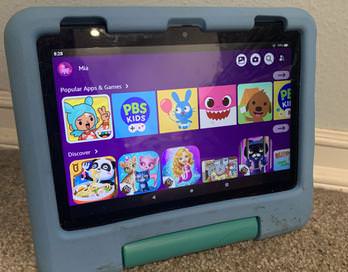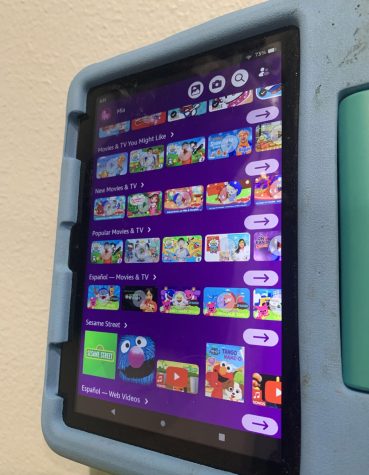The Impact of iPad Kids

A picture of a child’s tablet.
June 7, 2023
Tethered to a glowing screen and enclosed from the world beyond, today’s generation of tech-addicted children known as “iPad kids” are reshaping the future of childhood development and socialization.
While exposure to technology can help children navigate highly digital classrooms, I believe that the repercussions of the “iPad kid” phenomena are far greater than the benefits.
“iPad kids,” a term associated with a child’s excessive tablet use, has gained mass attention on all social media platforms. These children are often characterized by their grimy tablet cases, food-smudged fingers, and anti-social mannerisms.
Following the COVID-19 pandemic, children as young as three years old are being exposed to iPads, iPhones, tablets, etc. Active engagement with technology and the internet is quickly becoming the youth’s new norm.
According to a New York Times article, “Children spent, on average, 97 minutes a day on YouTube in March and April, up from 57 minutes in February, and nearly double the use a year prior.”
This sudden surge in screen time activity reflects the effects of the pandemic and the initiative of parents. With the pandemic’s closure of schools, children’s screen time significantly increased as a result of online classes. Based on a study published in the journal Jama Network Open, these spikes in electronic activity continue to persist even after the removal of social distancing measures.
Additionally, the transition to parents working from home has led to young children becoming heavily reliant on technology. Remote working parents depend on tablets and iPads to satisfy their child’s need for entertainment. Many parents look to technology to keep their children occupied and away from their professional duties, only noticing the consequences by the time their children are addicted to having screen time.
“iPad kids” signify a shift in parenting styles. Most adults now exhibit a permissive parenting style where they’re generally uninvolved in the activities of their child. They establish little to no rules and fail to monitor excessive electronic use. This generation of “iPad kids” are molding a new standard childhood, one that is defined by staying inside and being latched to a device.

According to Cleveland Clinic, children between the ages of 5 to 12 begin to form close friendships, develop personal interests, and socialize amongst their peers. Unlimited screen time clashes with a young child’s need to form early relationships.
“I am of the belief that kids need to go outside and play, entertain themselves and know what it means to be bored,” stated Mrs. Wells, a COMPASS AP Psychology and Modern World History teacher. “Some of the best fun and creativity can come out of being bored as a kid and I think our society has lost that idea.”
Personally, I have noticed the effects of “iPad kids” within my own family. My nieces and baby sister are constantly tethered to their tablets. Their day’s are defined by the amount of time they spend on the internet.
While handing a child a tablet may ease a parent’s stress, screen time still needs to be balanced. Parents can establish limitations on screen time and set time for their child to go outside. A healthy balance is what’s most needed to promote proper childhood development and socialization.































